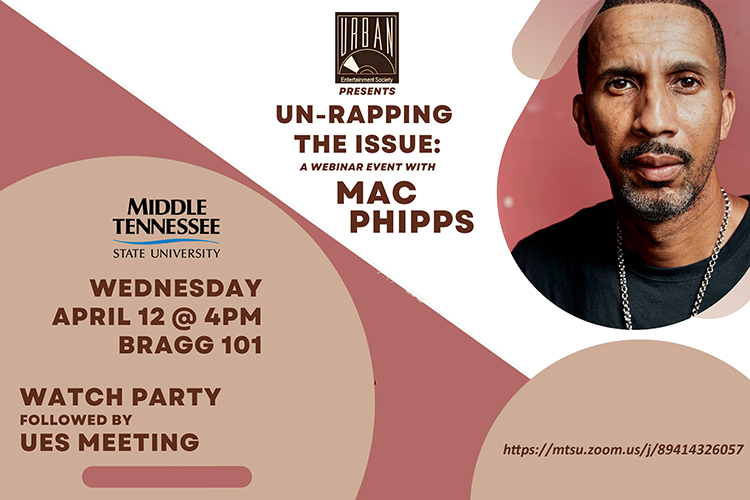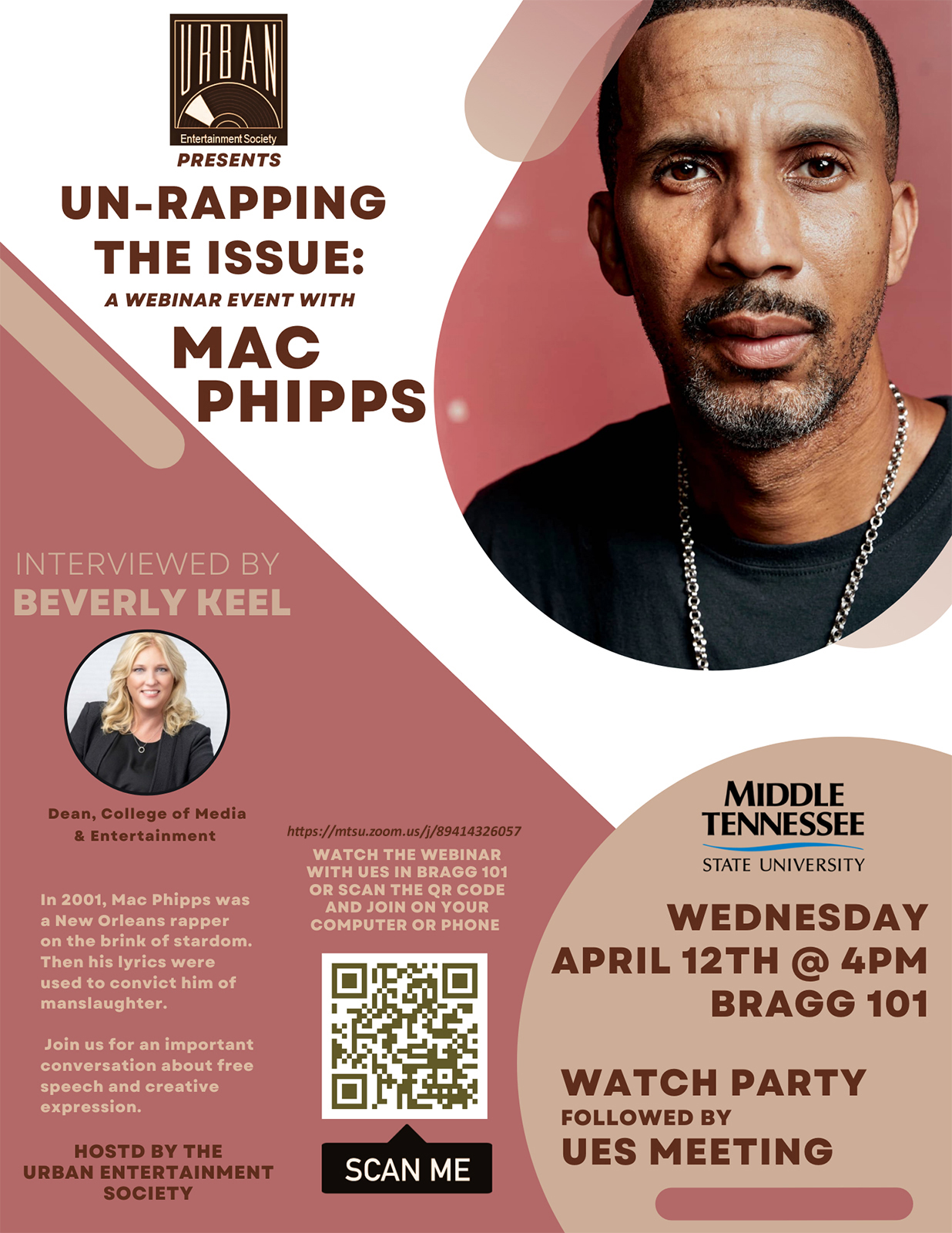Musician Mac Phipps is set for a special webinar Wednesday, April 12, with MTSU students as well as a potential worldwide audience when the university’s Urban Entertainment Society hosts a discussion on the practice of using rap lyrics in criminal court cases.
The issue has prompted both a book, “Rap on Trial,” and a new documentary, “Hip-Hop on Trial,” that point out how rap is the only music genre where creative expression has been used in court for criminal convictions, and it’s happened at least 500 times since 1991.
Phipps, who’ll speak via Zoom at 4 p.m. Central April 12 for “Un-Rapping the Issue: A Webinar Event with Mac Phipps,” was one of the musicians who found his lyrics used against him, resulting in a 2001 conviction for manslaughter.
Rappers Young Thug and Gunna both were indicted last year on racketeering and gang affiliation charges, in part using their song lyrics. Gunna pleaded guilty to a single RICO charge and has been released, while Young Thug’s eight-count trial is underway now in Atlanta.
Last fall, California passed the Decriminalizing Artistic Expression Act restricting the use of rap lyrics in that state’s courts, and efforts are underway to craft a federal version of the measure to help reduce racial bias in legal proceedings.
Students and on-campus guests can watch Phipps’ talk with College of Media and Entertainment Dean Beverly Keel in Room 101 of the Bragg Media and Entertainment Building, 1735 Blue Raider Drive. The webinar will be broadcast via Zoom at https://mtsu.zoom.us/j/89414326057.
An MTSU parking map is available at https://bit.ly/MTSUParking. Off-campus guests can park free in the university’s Rutherford Boulevard Lot and ride the Raider Xpress shuttle to the Bragg Building.

MTSU’s Urban Entertainment Society is a student organization, formed through the College of Media and Entertainment, that focuses on creating an inclusive entertainment community with music, dance, spoken word, and graphic arts via business and networking opportunities.
“UES was an incredibly active student organization prior to the pandemic,” says faculty advisor Denise Shackelford, who’s also an assistant professor in the college’s Department of Recording Industry.
“I formed a small group of seven people this semester to act as the re-launch steering committee, and they put together this webinar with Mac Phipps …, which will also be a membership drive.”
No physical evidence of crime

Phipps, born McKinley Phipps Jr. in New Orleans’ 3rd Ward and known by his initial stage name “Mac The Camouflage Assassin,” began rapping as a child and released his debut album in 1990 at age 13.
He also was a member of the supergroup 504 Boyz, and his Billboard-charting releases, especially 1998’s solo “Shell Shocked” and 504 Boyz’s “Goodfellas” in 2000, also earned him critical acclaim.
In February 2000, Phipps was about to perform at a Slidell, Louisiana, concert when a patron was fatally shot during a fight. Phipps was arrested for the slaying, convicted of manslaughter and sentenced to 30 years in prison.
The prosecutor in the case had no physical evidence against Phipps. Subsequent investigations by the Medill Justice Project at Northwestern University and by HuffPost showed that witnesses against the musician had been threatened and bullied for their testimony.

Instead of direct evidence, the assistant district attorney spliced together snippets of Phipps’ songs, ultimately telling the all-white jury: “This defendant who did this is the same defendant whose message is ‘Murder murder, kill, kill, you f–k with me you get a bullet in your brain.’ You don’t have to be a genius to figure out that one plus one equals two.”
Phipps appealed repeatedly for clemency and for his sentence to be commuted. He was granted parole and released from prison in June 2021 after serving 20 years.
“It’s UES’s goal to bring Mac and the authors of the ‘Rap on Trial’ book to campus in the fall,” Shackelford notes, adding that the organization also hopes to air the “Hip-Hop on Trial” documentary on campus before that visit.
Along with the Department of Recording Industry, MTSU’s College of Media and Entertainment also includes its School of Journalism and Strategic Media and the Department of Media Arts.

More information about the College of Media and Entertainment and its programs is available at www.mtsu.edu/media.
— Gina E. Fann (gina.fann@mtsu.edu)



COMMENTS ARE OFF THIS POST